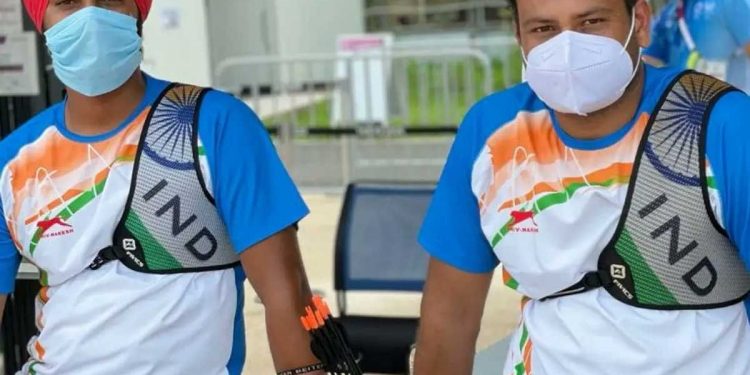Tokyo: Indian recurve archer duo of Vivek Chikara and Harvinder Singh kept medal hopes alive, sailing into their respective pre-quarterfinals of the men’s open section in the Paralympic Games here Friday.
World number 23 Singh, who became the first athlete from India to win a gold medal in para archery at a major competition in Asian Games Jakarta 2018, overcame a stiff challenge from Stefano Travisani of Italy to win 6-5 (10-7) via shootout.
The 30-year-old, who qualified as 21st seed, squandered a 4-0 lead after shooting a 7 in the third set as the Italian slowly bounced back to make it 5-all and force a shoot-off.
But Singh, who hails from a remote village Kaithal in Haryana, clinched the issue shooting a perfect 10 in the tie-breaker as his rival managed just 7.
An economics scholar from the Punjabi University, Singh will face Russian Paralympic Committee’s Bato Tsydendorzhiev later in the day.
Hailing from a middle-class farming family, Singh had dengue at one-and-a-half years and a local doctor administered him with an injection that had an adverse effect and his legs stopped working properly since then.
Asian Para Championship winner in 2019, Vivek Chikara, who finished in top-10 in the rankings round, stormed past Sri Lankan Sampath Bandara Megahamulea Gadara 6-2 to set up a last-16 clash with Great Britain’s David Phillips.
World number 13 Chikara, who competes with a prosthetic left-leg, overcame a blip in the second set when he misfired a 6 as he wrapped the issue with some consistent shooting.
An MBA and leading a corporate life, Chikara was about to marry his long-time girlfriend but life took a twist as he met with an accident on the New Year’s day of 2017.
Travelling to be with his family from Saharanpur, the Meerut lad’s motorcycle was hit by a speeding truck and his left leg had to be amputated below the knee.
Chikara then took up archery with the guidance of Athens 2004 Olympian Satyadev Prasad and won his major medal, winning a gold in Bangkok.
The Open event combines W2 (wheelchair) and ST (standing) classes, including athletes who have an impairment in the legs and use a wheelchair or have a balance impairment and shoot standing or resting on a stool.
In archery, the use of assistive equipment or an assistant is allowed depending on the impairment, while a variety of techniques may be employed, including pulling the bowstring with the mouth.






































